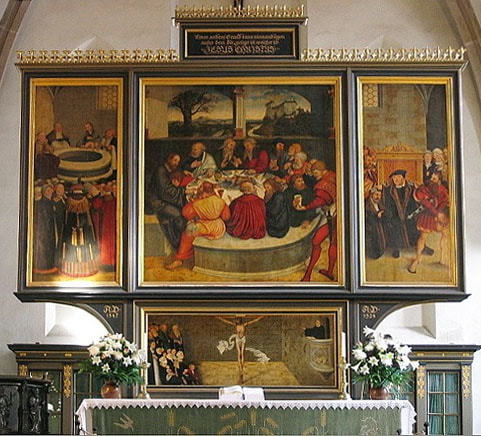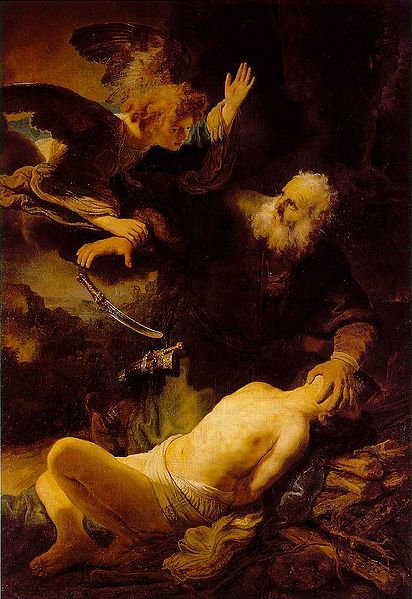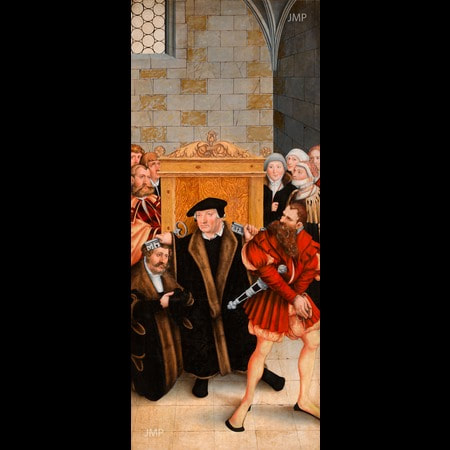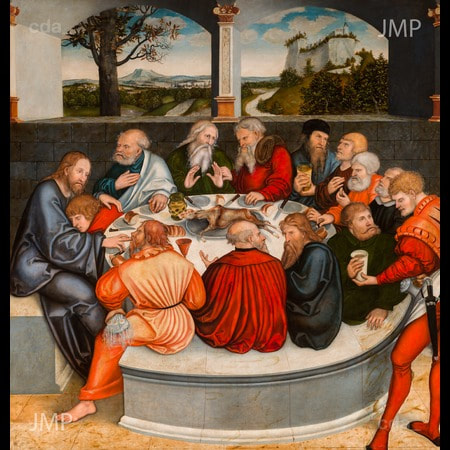Philippians 2:5-11
Pastor James Preus
Trinity Lutheran Church
March 31, 2021
“Have this mind among yourselves, which is also in Christ Jesus.” St. Paul tells us to have the mind of Christ. Of course, Christ Jesus is the Lord of heaven, who sits at God the Father’s right hand with all powers and dominions under his feet. So, should we behave as if we are kings and queens? Well, no. Especially not if you believe this means to behave proudly and to look down upon others. No, when St. Paul tells us to have the mind of Christ, he is telling us to follow Christ in his humiliation. Christ’s humiliation is when he was brought low for our sake. Although Jesus was in the form of God and indeed is equal to God the Father, being true God himself, Christ emptied himself.
What does it mean that Christ emptied himself? It does not mean that he ceased to be God. That is impossible. Jesus remained God throughout his earthly ministry, from the time he was in the womb of the Virgin Mary, to when he was laid in the manger in Bethlehem, as he walked throughout Israel, even as he hung nailed to a cross, Jesus remained truly God at all times. Yet, that he emptied himself means that he did not show or use his divine power. Rather, becoming a human being, he took on the form of a slave and became obedient even to death on the cross.
Why did Jesus do this? Why did he humble himself to suffer such pain and death? Well, surely God exalted him afterward and bestowed on him a name, which is above every name. But Christ already was exalted above all names. He was and is God from eternity. He didn’t need to come down to earth in order to earn praise in heaven. He didn’t need to earn the title of God’s Son. By his very essence, he is and always has been true God. All angels in heaven adored him at all times. Why then did Christ empty himself and endure the cross? It was for our sake. Out of love for us, he emptied himself, suffered and died, so that he could be a ransom for all.
Christ Jesus came to serve! He did not deny that he was the Lord of heaven by coming in the form of a servant. He was confident that he would be exalted above every name and that he would receive glory in heaven. Jesus did not scandalize the rulers of this world by riding into Jerusalem. He scandalized the rulers, because he did so in such a humble manner. He didn’t ride up with an army to King Herod’s palace and evict him. He didn’t form an army to fight off the Romans. He didn’t seek a kingdom on this earth or honor from earthly dignitaries. He came with the praises of the lowly, and less than a week later, he was nailed to the cross, without so much as raising a finger for his own protection. Rather, he rebuked his disciple for wielding a sword in his defense.
This is scandalizing to a world that seeks after power and position. Yet, how silly would it be for the Lord of heaven to come to earth to establish an earthly kingdom to receive praise from mortals until they die and go to hell? Why would Christ exchange his infinitely marvelous throne in heaven for a meager kingship here on earth? No, it was precisely because he knew that he would receive his throne in heaven while gaining his precious people ransomed by his blood, that he was willing to forsake all temptation to gain a kingdom on this earth. Jesus came to serve, so that we could be saved. He humbled himself, so that he could possess us in his exaltation.
We are to have this mind of Christ, to be humble toward one another, to think of others’ needs before our own, to consider others more significant than ourselves. Such an attitude is to follow in the mind of Christ. Yet, you cannot fulfill this command of St. Paul by simply trying very hard to be humble and to serve others. St. Paul is not speaking of simply outward actions. He is speaking of having a different mind than the type you were born with. This can only happen through faith in Christ.
A humble spirit is a fruit of faith. We become as Christ is through faith. Saving faith is a gift from God. We do not believe that we deserve to be saved. We do not believe that we have earned our salvation. Rather, we believe that Christ out of love for us emptied himself and became a servant, even to the point of death on the cross, in order to redeem us from our own sins. We do not have grounds to boast. Rather, we receive citizenship in God’s kingdom through faith in God’s promise. If God did not spare his own Son, but gave him up to die on the cross for us, then God must love us! If Jesus did not refuse the cross, but willingly bore its shame, then Christ Jesus must love us. It is only through faith in this promise of forgiveness and adoption as God’s children that we can have confidence to humble ourselves.
Yes, confidence to humble ourselves. Christ Jesus was confident to go to the cross and let himself be killed, because he knew his Father would raise him up and restore his kingdom to him. We too then, should be confident in Christ to bear all suffering, shame, and humility.
Why is it good to humble yourself? First, in order to crucify your prideful flesh, so that you remember that you are a citizen of heaven. St. Paul writes later on in this same epistle to the Philippians, “Brothers, join in imitating me, and keep your eyes on those who walk according to the example you have in us. For many, of whom I have often told you and now tell you even with tears, walk as enemies of the cross of Christ. There end is destruction, their god is their belly, and they glory in their shame, with minds set on earthly things. But our citizenship is in heaven, and from it we await a Savior, the Lord Jesus Christ, who will transform our lowly body to be like his glorious body, by the power that enables him even to subject all things to himself.” (Philippians 3:17-21)
To live in pride is to live contrary to the Gospel. It is to serve your own belly and to live in a delusion. Through faith, we must believe that we are sons and daughters of God! We must believe that we are princes and princesses of God’s kingdom. Why on earth would you exchange that for some glory here on earth? We fight with each other. We think we’re better than others. We seek honor, and respect here on earth. Everyone behaves like Yertle the Turtle, trying to be king of all that we see, but in the end we’re king of nothing but mud. Our sinful flesh drives us to exalt ourselves above others, to think that our wants are more important than the wants of others, that our needs are more pressing than the needs of others, that our opinions should be considered more exceptional than others'. And all this just to give ourselves a nice view before we fall into the mud.
Yet, when we crucify our pride every day, and walk in humility, we walk according to the Gospel. We confess that we do not deserve anything in heaven or on earth, but we trust that God will give us what we need. We do not need to fight for status in this world, because God has given us the greatest status imaginable by adopting us as his children through faith in Christ. Jesus didn’t seek to dethrone Herod or Pilate, because he had a throne in heaven that would never fade. So, we do not need to prop ourselves up or tear others down, because God will exalt us, as Jesus promised again and again, “Whoever humbles himself will be exalted.”
Secondly, we humble ourselves for the sake of our neighbor. St. Paul says, “In humility count others more significant than yourselves. Let each of you look not only to his own interests, but also to the interests of others.” By having the mind of Christ and humbling yourself, you benefit your neighbor’s body and his soul. You benefit his body, because when you stop thinking only of yourself, you’re able to think about the needs of others. Is your neighbor hungry or thirsty, cold or naked? Is your neighbor mourning, distressed, anxious, or otherwise in need? You won’t know if all you think about is yourself.
But much more, by being humble, you benefit your neighbor’s soul. When you don’t bite back or insult those who revile you, you send a message to your enemies. When you’re patient, kind, and forgiving, you show Christ to your neighbor. St. Paul says that he has become all things to all people, so that he might by all means save some. Although, it is the proud who demand attention from others, it is the meek and humble, the patient and kind who are able to touch the hearts of others. When we forgive others, bear with their weaknesses, and seek not to boast in ourselves, but in Christ alone, we do not put a stumbling block in their way to believe in Christ. Rather, we glorify our heavenly Father by showing honor to Jesus.
Christ has received a name that is above every name. That name is Jesus. At the name of Jesus every knee shall bow in heaven and on earth and under the earth and every tongue shall confess that Jesus Christ is Lord to the Glory of God the Father. Every knee means every knee. Every tongue means every tongue. In heaven the saints and angels shall praise Jesus and confess him as Lord. On earth, everyone, both Christians and unbelievers will confess Jesus as Lord. In hell, even Satan himself will bend the knee and confess Christ Jesus as Lord. This is Christ’s victory over Satan and hell. All powers are placed under Jesus’ feet. Yet, not all willingly. Satan will not confess Jesus as his Savior. The damned will not be glad that Jesus is Lord. They will confess with gnashing of teeth, because they rejected him. But everyone will confess him, because Jesus is Lord of all.
But we who bend the knee today and who confess Christ Jesus as Lord today, will with joy and gladness confess Jesus Christ as Lord to the glory of God the Father, because Christ has humbled himself for our sake, to rescue us in our misery. He has humbled himself, that he might lead us out of captivity and bring us into his kingdom. We are humble today, because we are confident in Christ’s exaltation. And we are confident that on account of Christ’s humiliation, he will exalt us in his exaltation.
The name Jesus means, The LORD saves. This salvation can only be received through faith. So, we in humility bend the knee to Jesus and confess him as Lord through faith alone. We believe that Christ has put his name on us in Baptism, that we have died and risen again with him in Baptism. In fact, we die with Christ every day to sin and pride, and we rise with the mind of Christ, set on serving our neighbor and our God. Jesus did not lose his throne in heaven by humbling himself in service to his neighbor, so neither can we lose our inheritance in heaven by losing praise here on earth. So, let us follow Christ in his humiliation here on earth, so that we may follow him in his exaltation to glory in heaven. Amen.






 RSS Feed
RSS Feed